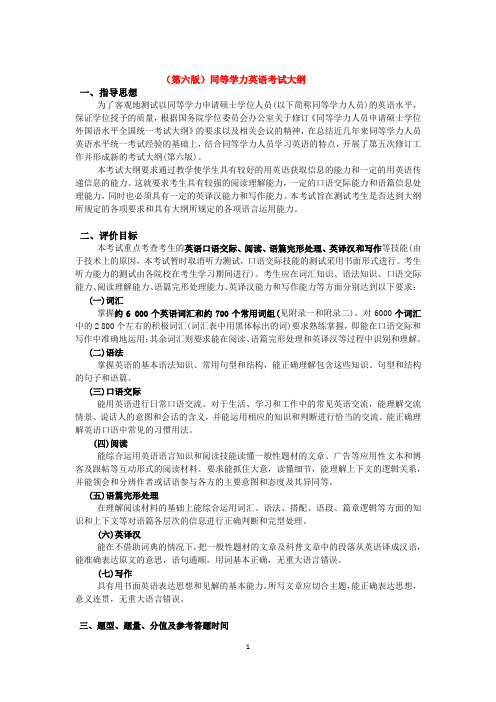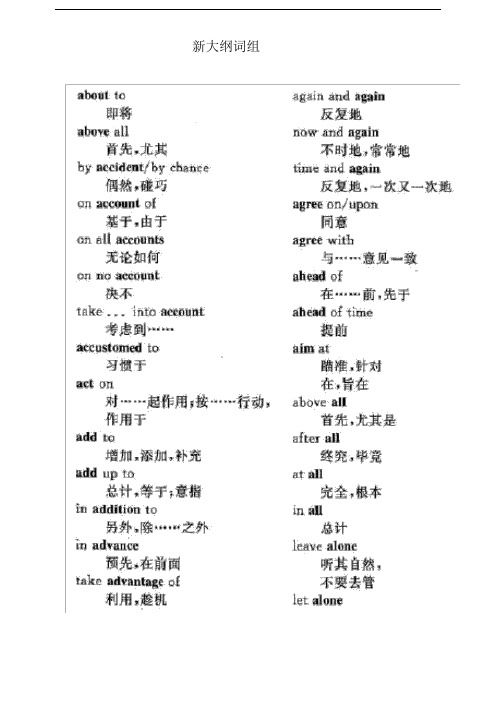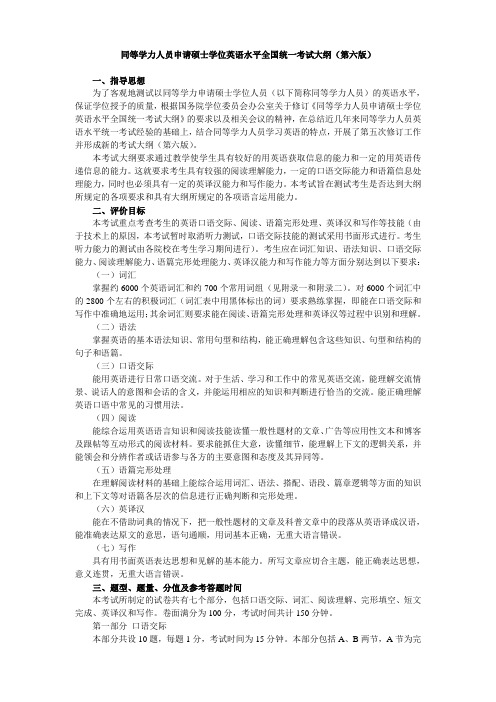同等学力英语申硕考试词组第六版大纲)word版-可编辑
同等学力英语(第六版)考试大纲及样卷

同等学力英语(第六版)考试大纲及样卷同等学力英语(第六版)考试大纲及样卷同等学力英语考试是为了评估非英语专业硕士研究生在英语听、说、读、写方面的能力而设计的考试。
本文将介绍同等学力英语考试的大纲和样卷,帮助考生更好地了解考试的要求和格式。
一、考试大纲同等学力英语考试的大纲主要分为听力、口语、阅读和写作四个部分。
1. 听力同等学力英语考试的听力部分主要测试考生对英语语音、语调和基本听力技巧的掌握。
考试内容包括听短对话、长对话、短文等各类听力材料,并以选择题的形式进行答题。
2. 口语同等学力英语考试的口语部分主要测试考生的口语表达能力和交际能力。
考试内容包括个人陈述、对话、讨论等形式,要求考生能够进行流利的口语表达,准确地传达自己的观点和意见。
3. 阅读同等学力英语考试的阅读部分主要测试考生的阅读理解和分析能力。
考试内容包括短文阅读、长篇阅读等,考生需要准确理解文章的主旨和细节,并进行相关问题的答题。
4. 写作同等学力英语考试的写作部分主要测试考生的写作能力和组织能力。
考试内容包括作文、写信等形式,要求考生能够清晰地表达自己的观点和论据,同时具备良好的语法和词汇运用能力。
二、样卷分析为了更好地帮助考生熟悉考试形式和内容,同等学力英语考试提供了样卷供考生参考。
1. 听力样卷同等学力英语考试的听力样卷主要包括听力材料和相应的选择题。
考生需要仔细听取录音,并根据所听内容选择正确的答案。
样卷中的听力材料包括日常生活对话、新闻报道等,旨在考察考生的听力理解能力。
2. 口语样卷同等学力英语考试的口语样卷主要包括个人陈述和对话。
考生需要根据题目要求进行个人陈述或对话,展示自己的口语表达能力和交际能力。
样卷中的口语题目包括个人介绍、描述图片、讨论问题等,旨在考察考生的口语流利程度和语言交际能力。
3. 阅读样卷同等学力英语考试的阅读样卷主要包括短文阅读和长篇阅读。
考生需要仔细阅读文章,并回答相关的问题。
样卷中的文章内容涵盖社会、文化、科技等多个领域,旨在考察考生的阅读理解和分析能力。
同等学力人员申请硕士学位英语统考第六版新大纲讲解共43页文档共45页文档

1、合法而稳定的权力在使用得当时很 少遇到 抵抗。 ——塞 ·约翰 逊 2、权力会使人渐渐失去温厚善良的美 德。— —伯克
3、最大限度地行使权力总是令人反感 ;权力 不易确 定之处 始终存 在着危 险。— —塞·约翰逊 4、权力会奴化一切。——塔西佗
5、虽然权力是一头固执的熊,可是金 子可以 拉着它 的鼻子 走。— —莎士 比
6、最大的骄傲于最大的自卑都表示心灵的最软弱无力。——斯宾诺莎 7、自知之明是最难得的知识。——西班牙 8、勇气通往天堂,怯懦通往地狱。——塞内加 9、有时候读书是一种巧妙地避开思考的方法。——赫尔普斯 10、阅读一切好书如同和过去最杰出的人谈话。——笛卡
同等学力英语(第六版)考试大纲及样卷

(第六版)同等学力英语考试大纲一、指导思想为了客观地测试以同等学力申请硕士学位人员(以下简称同等学力人员)的英语水平,保证学位授予的质量,根据国务院学位委员会办公室关于修订《同等学力人员申请硕士学位外国语水平全国统一考试大纲》的要求以及相关会议的精神,在总结近几年来同等学力人员英语水平统一考试经验的基础上,结合同等学力人员学习英语的特点,开展了第五次修订工作并形成新的考试大纲(第六版)。
本考试大纲要求通过教学使学生具有较好的用英语获取信息的能力和一定的用英语传递信息的能力。
这就要求考生具有较强的阅读理解能力,一定的口语交际能力和语篇信息处理能力,同时也必须具有一定的英译汉能力和写作能力。
本考试旨在测试考生是否达到大纲所规定的各项要求和具有大纲所规定的各项语言运用能力。
二、评价目标本考试重点考查考生的英语口语交际、阅读、语篇完形处理、英译汉和写作等技能(由于技术上的原因,本考试暂时取消听力测试,口语交际技能的测试采用书面形式进行。
考生听力能力的测试由各院校在考生学习期间进行)。
考生应在词汇知识、语法知识、口语交际能力、阅读理解能力、语篇完形处理能力、英译汉能力和写作能力等方面分别达到以下要求: (一)词汇掌握约6 000个英语词汇和约700个常用词组(见附录一和附录二)。
对6000个词汇中的2 800个左右的积极词汇(词汇表中用黑体标出的词)要求熟练掌握,即能在口语交际和写作中准确地运用;其余词汇则要求能在阅读、语篇完形处理和英译汉等过程中识别和理解。
(二)语法掌握英语的基本语法知识、常用句型和结构,能正确理解包含这些知识、句型和结构的句子和语篇。
(三)口语交际能用英语进行日常口语交流。
对于生活、学习和工作中的常见英语交流,能理解交流情景、说话人的意图和会话的含义,并能运用相应的知识和判断进行恰当的交流。
能正确理解英语口语中常见的习惯用法。
(四)阅读能综合运用英语语言知识和阅读技能读懂一般性题材的文章、广告等应用性文本和博客及跟帖等互动形式的阅读材料。
(完整版)同等学力申硕英语第六版大纲词组及核心词组.doc

新大纲词组核心词组Aa bit一点,少a bit of一点儿的a few一些;几个(修可数名,表示肯定意思)a great many/a good many多,大量a good\great deal多,很多;⋯⋯得多a little\few (of)一点儿a lot (of) \lots of多大量;非常,相当a number of若干,一些;多the great number of最大数量的the largest number of大多数的the total number of数a series of一系列的;一串的a variety of多种的,各种各的about to即将above all首先,首要,尤其是,最重要的是account for⋯ 有任;⋯做出解;明⋯⋯的原因accustomed to 于act on⋯⋯起作用;按⋯⋯行,作用于adapt... to改;使适合,使适用add to增加,添加,充add up to合达,达;累,等于,数达;意指again and again反复地agree on/upon with/to⋯取得一致意after a while了一会after all 1.竟,究,,到底,根底2.然⋯可是;尽管⋯到底3.要知道;忘了 [ 提醒某人用 ]ahead of 在⋯⋯前,先于ahead of time提前aim at all along 瞄准,;在,旨在始,一直all at once 1.同,一起2.突然,忽然,出乎意料地3.上all of a sudden突然地,出乎意料地all out全力以赴all over到,遍及;身;全部束all right好;利;正确的all round周,all the more越all the same同all the time始,一直allow for考到,及and so on\forth等等;如此anything but 1.决不,并没有,根本不,一点也不,毫不,不,非2.不,恰恰不,除⋯之外什么都apart from 1. 除开,除掉,撇开,除了⋯之外,除⋯外 ( 无) 且不,不提,只要⋯ ( 否 ) ,要不是,若不是,若无2.除⋯外 ( 尚有 )3.脱离开,和⋯离开,离appeal to呼吁;上;要求;⋯有吸引力apply to 1. 用于;与⋯有关;2.把⋯涂于,敷于,搽于,施于 ( 表面 ) ,⋯涂 ( 或敷 ) 上3.使接触,使靠近4.向⋯正式申;向⋯要求5.致力于,心致志于6.把⋯用于;把 ( 能力等 ) 用于approve of ,一;批准,通arm in arm 手挽着手;同around the clock/round the clock 昼夜不断地,24 小地as a matter of fact 上;事上;其as a result (of) 果as a rule通常,一般来as⋯as 与⋯⋯一as far as 1. (表示程度或范)就⋯,尽⋯,至于2.像⋯那么,一直到⋯,到⋯as far as...be concerned就⋯..而言as follows 如下as for/as to 1.就⋯而,到;在⋯方面2.至于,关于as good as 和⋯几乎一,上等于⋯ asif\though 犹如,好似,不妨as(so) long as 1.达;达⋯之久2.当⋯候3.既然,由于,因4.如果,只要,在⋯情形下5.[ 美国英 ] 既然at a distance隔开一段距离at the spot在as/so far as只要,就⋯⋯而言as regards 1.至于,关于;就⋯而,在⋯方面2.根据,按照,依照as soon as一⋯就⋯as to至于,关于;就⋯⋯而as usual像往常一;照例as well同,也;倒不如as well as 1.除⋯之外(也),同⋯一(也),和,也,2.与⋯一 ( 程度 )3.既⋯又⋯ [well]4.与⋯相同;不于⋯5.此外,也as yet到目前止aside from除⋯以外ask after ask for探,候求,要求;找at a loss 1.困惑;;不知所措;无可施2.本;本地3.( 犬 ) 失去物踪迹at a time 每次,一次;个地;同,一下子 at all 完全,根本at all costs不惜任何代价,无如何at (all) times 始,常;随,是,老是;不什么候at any rate不管怎么,无如何;至少at any time在任何候at best/at the best最多,充其量,至多at the cost of以⋯⋯代价at first起先,首先;最初at first sight乍一看;初看之下at hand 在手;即将到来at heart本上,内心里at home 在家;在国内;熟悉,自在,自如at intervals,不;相隔一定距离(或)at large尽的;未被捕的,整个的at last最后;于at least\most至少/至多at length 1.最后,最,于,后来2.完全地,尽地,充分地,底地,全部3.久地,地at most/at the most最多,至多at no time从不,决不at once上,立刻at one time曾,一度;同at present目前,在at random随机地,无目的地at sb's disposal由支配;任理attend to注意;照料;致力于at the cost of以⋯代价at the mercy of任凭⋯的布;完全受⋯的支配;在⋯掌握中at the moment 此刻;当at the same time 1.同,一2.不,然而;如此,尽管如此at times有at work在工作,忙于Bback and forth反复地,来回地back down/off放弃,步,退却back up 支持,援助;(料)份;倒退;裱 based on以⋯⋯基be about to 即将;要;正打算because of 由于,因begin with 从⋯⋯开始believe in 信仰;信任be in the right 有理的be made up of 由⋯所成 ( 可以看出材料 )be made from 由⋯所成 ( 看不出材料 )be/get ready for 愿意,准好be sure of 确信be/get used to 于benefit from 得益于;得利于;因⋯而得到好bear/have/keep in mind 住;考到because of 因;由于before long 不久以后beside the point 离,不相干better off 富裕起来,(日子好起来)beyond/without question 没bit by bit 一点点地,地boast of/about 夸耀,大both ⋯ and ⋯既⋯又⋯break away脱离;放弃;逃跑break down掉,停,倒塌,中止,掉,分解,抛break in(into),入,打断,开始工作break off打断,脱落break out爆;突break through突,突破;有重要break up打碎,分裂,散bring about引起,致使,造成,达成,使康复bring down使落下,使倒下,降低(价格)bring forward提前,关注,把。
同等学力申硕英语第六版大纲词组

同等学力申硕英语第六版大纲词组同等学力申硕英语考试是为了毕业于普通本专科院校的学生提供升学深造的机会。
对于考生来说,掌握考试大纲中的词组是非常重要的,因为这些词组往往是考试中的重点和难点。
本文将介绍同等学力申硕英语第六版大纲中常见的词组,并提供适用的格式进行呈现。
1. 笔记和学习方法首先,无论学习什么课程,好的笔记是非常重要的。
同等学历申硕英语要求考生有良好的阅读理解和写作能力。
对于阅读理解的学习,可以使用一些方法来提高效率。
例如,采用主题法,将同一主题相关的文章和词组放在一起进行学习;使用归纳法,将文章中的关键词和词组整理成表格或图表,便于记忆和理解。
另外,背诵和掌握例句也是提高写作能力的有效途径。
同等学力申硕英语写作要求考生能够清晰准确地表达自己的观点和看法。
通过背诵和模仿优秀范文中的词组和句型,可以提高写作的表达能力。
2. 阅读理解的词组同等学力申硕英语考试中的阅读理解部分常常包含一些固定的搭配和词组。
这些词组不仅能够帮助理解文章,还能提高阅读速度和准确性。
以下是一些常见的词组:- as a matter of fact(事实上)- in light of(鉴于)- due to(由于)- under no circumstances(无论如何)- by means of(通过)- regardless of(不管)- on behalf of(代表)- in terms of(就...而言)- as far as...is concerned(就...而言)3. 写作中常用的词组同等学力申硕英语写作中,使用恰当的词组可以使文章更具表达力和逻辑性。
以下是一些常见的写作词组:- take into consideration(考虑到)- play a crucial role in(在...中起到重要作用)- give rise to(引起)- have a profound impact on(对...有深远影响)- be conducive to(有利于)- shed light on(阐明)- be in line with(与...一致)- be characterized by(以...为特点)4. 口语交流的词组同等学力申硕英语考试中的口语交流部分,考生需要能够流利地表达自己的观点和看法。
同等学力第六版大纲词汇

n.空气,大气,大气层,气氛
atom
n.原子
attack
vt./n.1.攻击,袭击;2.(病)发作
attempt
n./vt.企图,试图
attend
vi.照顾某人;vt.出席,参加
attention
n.1.注意,留意;2.立正
attitude
n.态度,看法
attract
vt.吸引;引诱
vt.1.逗乐,使开心;2.给…提供娱乐
analysis
n.分析,分解
analyze/-yse
vt.分析,分解
ancient
a.古代的,古老的,古式的
and
conj.1.和,与,加;2.那么,则
anger
n.生气,气愤 vt.激怒,使生气,使发怒
angry
a.发怒的,愤怒的
animal
n.动物,野兽,牲畜 a.动物的,野兽的
allow
vt.1.允许,准许;2.承认;3.给予 vi.(for)考虑到,顾及
almost
ad.几乎,差不多
alone
a.1.单独的,孤独的;2.唯一的;ad.1.单独地,独自地;2.只有,仅仅
along
prep.沿着 ad.向前
aloud
ad.1.大声地;2.响亮地
already
ad.早已,已经
any
a.1.一些,什么(否/疑/条件句);2.任何的;pron.任何一个,无论哪个,无论哪些
anybody
pron.任何人;随便哪一个人
anyhow
ad.无论如何,不管怎样,不管以什么方法,总之
anyone=anybody
anything
(完整版)同等学力申硕英语大纲词汇(第六版)

英汉词性英汉词性英汉词性abandon放弃,抛弃,离弃vt afternoon下午,午后ad ambassador大使n ability能力,才干,才能n again再,又,重新ad ambition雄心,野心n able有能力的,能干的a against反对,违反,靠近prep ambitious有雄心的,有抱负的n aboard在船上,在车上ad age年龄,时代,变老n,vi ambulance救护车n about关于,对于,在…周围prep agency代理,代办n America美洲,美国n above在…之上,超过prep agenda议事日程,记事册n American美国人的,美国人a,nabroad国外,海外,传开ad agent代理人,经办人n among在…之中,在…之间prep absence缺乏,缺席n ago以前,…前ad amount数量,总数,合计n,vt absent缺席的,缺乏的a agree同意,一致,适合,商定vi amuse逗乐,使开心vt absolute绝对的,完全的a agreeable使人愉快的,欣然同意的a analysis分析,解析n absorb吸收,吸引,使专心vt agreement一致,协议,契约n analyze分析,解析v abstract摘要,提要,抽象的n,aahead前头,在前,向前ad ancient古代的,古老的a abuse滥用,虐待,辱骂n,vt aid援助,救援,助手,辅助物vi,nand和,与,那么conj academy学院,研究院n aim瞄准,志在,针对,目标vi,vt,nanger气氛,使发怒,激怒n,vt accent重音,口音n air空气,天空,晾干n,vangry愤怒的,生气的a accept同意,认可,接受vt airline航空公司,航线n animal动物,野兽,动物的n,aacceptable可接受的,合意的a airplane飞机n annoy使烦恼,打搅vt access通路,访问,存取n,vt airport机场n annual每年的,年度的,年刊a,naccident事故,意外的事n alcohol酒精,乙醇n another另一,别的,另一个a,pron accommodation住处,膳宿n alike相同的,相似的a answer回答,答案n,vaccording to按照,根据prep alive活着的,活跃的,活泼的a anticipate预期,指望,期待vtaccordingly因此,从而ad all全部的,非常的,完全地a,pron,adanxiety挂念,担心,渴望n account账户,说明,叙述n allow允许,给予,考虑到vt,vi anxious担心的,焦虑的a accurate正确的,精确的a almost几乎,差不多ad any任何的,无论哪个a accuse谴责,指控,告发vt alone独自,单独,仅仅,只a,ad anybody任何人,随便哪个人pronaccustomed惯常的,习惯的a along沿着,向前prep,ad anyhow无论如何,总之,不管怎样adache疼痛,酸痛n aloud大声地,响亮地ad anything无论什么事pron achieve完成,达到,获得vt already已经ad anywhere无论哪里,任何地方ad acid酸,酸的n,aalso也,同样,而且ad apartment一套房间n acquaintance熟人,相识的人n although虽然,即使aonj apologize道歉,赔罪vi acquire取得,获得,学到vt altogether完全,总之ad apology道歉,歉意n同等学力申硕英语大纲词汇(第六版)acre非洲人n always总是,永远ad appear出现,出场,问世,好像是viafter在…之后,以后prep,ad amazing令人惊讶的a appetite食欲,胃口,欲望n英汉词性英汉词性英汉词性apple苹果n assume假定,设想,假装,承担vt bag袋,提包,背包n apply申请,运用vi,vt assure使确信,向…保证vt baggage行李n appoint任命,委派,约定vt astonish使惊讶,使吃惊vt bake烤,烘焙vappointment约会,任命,委派n astronaut宇航员,太空人n balance平衡,使平衡,结余,天平vt,nappreciate感激,评价,欣赏vt at在,于,对,向,以prep bald秃顶的,单调的a approach接近,处理,方法v,vt,natmosphere大气,气氛,空气n ball球,大型舞会n approval同意,赞同,批准n atom原子n banana香蕉nApril四月n attack攻击,进攻,发作,抨击vt band条,带,乐队,一群,波段nArab阿拉伯人,阿拉伯的n,aattempt试图,努力vt bank岸,堤,银行n Arabian阿拉伯人的a attend出席,参加,注意,留意vt,vi banker银行家narea面积,地区,范围,领域n attention注意,注意力,留意n bar棍,横木,闩,酒吧n argue辩论,争论,论证,说服vi,vt attitude态度,看法n bare赤裸的,空的,仅有的a argument争论,论点,依据n attract吸引,招引,引诱v base基础,把…建立在…基础上n,vt arise出现,发生,引起vi attractive有吸引力的,有魅力的a basic基本的,根本的,基本a,narm手臂,武器,武装n,vt audience听众,观众n basically基本地,根本地ad around周围,到处,大约ad,prep audio声音,听觉,音响,音频n basketball篮球n arouse唤起,激起vt August八月n bath洗澡,浴缸,浴池n arrange整理,布置,安排vt aunt伯母,婶母,姑母,舅母n bathroom浴室n arrangement安排,整理n Australia澳洲,澳大利亚n battle战斗,战争,搏斗n,vi arrest逮捕,扣留vt Australian澳洲的,澳大利亚的a,nbe是,等于,存在vi,aux arrive到达,达成,得出vi author作者n beach海滨,沙滩n article文章,物件n auto汽车n bear熊,忍受,负荷,生育n,vt artificial人工的,人为的a autumn秋季n beat打败,战胜,跳,拍子v,nas当…时候,由于,因为conj,prepavailable可利用的,可得到的a beautiful美丽的a ashamed惭愧的,害臊的a average平均,平均数,平常的,普通的n,abecause因为conj Asia亚洲n avoid避免,逃避vt become变成,成为vi Asian亚洲人n award奖品,授予,奖给n,vt bed床,苗圃,河床,海底n aside在旁边,到一边ad aware知道的,意识到的a bee蜜蜂nask问,询问,请求,邀请v away远离,离开ad beef牛肉n asleep睡着的ad awful糟糕的,极坏的a beer啤酒n aspect样子,面貌,方面n awkward粗笨的,尴尬的,棘手的a before在…之前,从前,早些时候prep,ad assignment任务,作业,分配,指派n baby婴儿,孩子n begin开始,着手v assist帮助,援助vi back向后,背面,后面的ad,n,abeginning开始,起因nassociate联系,交往,合作人,同事vt,vi,nbackground背景,经历n behave举动,举止,表现v association协会,团体,交往,联合n bad坏的,低劣的,厉害的a behavior行为,举止n英汉词性英汉词性英汉词性behind在…后面,落后于,落后prep,ad bomb炸弹,轰炸n,vt burden重担,负担,义务,责任nbelief相信,信仰,信念vt,vi bone骨骼n burn燃烧,烧毁,烧伤v,nbelieve相信,认为,信奉vt,vi book书籍,预订n,vt bury埋,安葬vtbelong属于,附属,归类于vi boom隆隆声,繁荣v,nbus公共汽车nbelow在…下面,向下,以下prep,ad boot靴子n business生意,业务,事物,职责nbeneath在…下方,在下方prep,ad border边缘,交界,与…相似n,Vi busy忙碌,热闹的,占线abenefit利益,恩惠,得益于n,vt,vi boring令人厌烦的,钻孔a,nbut可是,但是,仅仅conj,prep,ad beside在…旁边,和…相比prep born出生的,天生的,生来的a buy购买vtbesides而且,还有,除…之外ad,prep borrow借用vt by靠近,被,由,通过,按照prepbest最好的,最好a,ad boss老板,上司,头儿n cake蛋糕,饼nbetter较好的,更好,改良a,ad,vt both二者,双方,双pron,acalculate计算,推算,计划vt between在…中间,当中,中间prep,ad bother打扰,麻烦,担心,焦急vt,vi,ncall称为,拜访,号召,访问vt,vi,nbicycle自行车n bottle瓶子n calm平静,沉着,镇定a,v,nbig大的,重要的a bottom底部n camera照相机,摄影机nbill账单,票据,纸币,提案n bowl碗n camp野营,帐篷,宿营n,vi bind绑,包扎,束缚vt box盒子,箱子,拳击,打耳光n,vi campus校园nbird鸟,禽n boxing拳击n can能,会,可能,铁罐aux,nbirth出生,起源n boy男孩,儿子n Canada加拿大n birthday生日n brain大脑,心智,智力n Canadian加拿大人a,nbit一片,一些,一点n branch树枝,分支,分科n cancel取消,删去,撤销vtbitter苦味的,痛苦的,严寒的a brave勇敢的,英勇的a cap军帽,帽状物nblack黑色,黑暗,黑人a,nbreak打破,损坏,总之,破裂vt,n,vi capable能干的,有能力的ablame责备,责任,责怪vt,nbreakfast早餐n capital首都,资本,主要的,基本的n,ableed出血,流血vi breakthrough突破,突破性的发现n captain首领,队长,陆军,上尉nblind盲的,瞎的,使失明,蒙蔽a,vt breath呼吸,气息n capture捕获,捉拿,夺取,攻占vtblock阻塞,街区,大块,路障vt,nbrief简短,短暂,简单介绍a,vt car汽车,车辆nblood血液,血统,血亲n bright明亮的,聪明的,美好的a card卡片,名片,纸片nblow吹气,爆炸,殴打,打击vi,nbring带来,产生,引起v care注意,小心,照料,愿意n,vi blue蓝色的,忧郁的,蓝色a,nBritish英国人a,ncareful小心的,仔细的aboard木板,董事会,上车n,vt broad宽广,宽宏,豁达a careless粗心的,草率的aboast夸耀,吹嘘,自吹自擂vi,vt,nbrother兄弟,同胞n carry搬运,携带,传递,传播vtboat小船n brown棕色a,ncase事实,案件,箱子,盒子nbody身体,主体,物体,尸体n brush刷,毛刷,画笔vt,ncash现金nboil沸腾,煮沸vi,vt build建造,建立,修建vt casual随便的,偶然的,临时的a bold勇敢的,冒失的,粗的a building建筑物,大楼n cat猫n英汉词性英汉词性英汉词性catch捕捉,赶上,感染,听清楚vt circle圆,圈子,集团,环绕n,vcommand命令,指挥,掌握,运用能力vt,ncattle牛n circumstance情形,环境,条件n comment解说,评论n,vcause原因,事业,奋斗,引起n,vt city城市,都市n commit犯罪,把…交托给,使…承担vt celebrate庆祝,祝贺vt claim声称,主张,权利,要求vt,ncommitment承诺,信奉,献身,义务n cent分,分币,百n class种类,等级,班级,课n common普通的,平常的,公共的a center中心,中央,集中n,vclassic名著,杰作n communicate传达,交流,通讯vt,vi central中心的,中枢的,主要的a classmate同班同学n community社区n century世纪,百年n classroom教室n company公司,商号,陪伴,同伴n ceremony仪式,典礼,礼节n clean清洁的,干净的,弄干净a,vt compare比较,相比,对照vt certain确实的,可靠的,必然的a clear明亮的,晴朗的,澄清a,vt comparison比较。
(完整版)同等学力人员申请硕士学位英语水平全国统一考试大纲(第六版)

同等学力人员申请硕士学位英语水平全国统一考试大纲(第六版)一、指导思想为了客观地测试以同等学力申请硕士学位人员(以下简称同等学力人员)的英语水平,保证学位授予的质量,根据国务院学位委员会办公室关于修订《同等学力人员申请硕士学位英语水平全国统一考试大纲》的要求以及相关会议的精神,在总结近几年来同等学力人员英语水平统一考试经验的基础上,结合同等学力人员学习英语的特点,开展了第五次修订工作并形成新的考试大纲(第六版)。
本考试大纲要求通过教学使学生具有较好的用英语获取信息的能力和一定的用英语传递信息的能力。
这就要求考生具有较强的阅读理解能力,一定的口语交际能力和语篇信息处理能力,同时也必须具有一定的英译汉能力和写作能力。
本考试旨在测试考生是否达到大纲所规定的各项要求和具有大纲所规定的各项语言运用能力。
二、评价目标本考试重点考查考生的英语口语交际、阅读、语篇完形处理、英译汉和写作等技能(由于技术上的原因,本考试暂时取消听力测试,口语交际技能的测试采用书面形式进行。
考生听力能力的测试由各院校在考生学习期间进行)。
考生应在词汇知识、语法知识、口语交际能力、阅读理解能力、语篇完形处理能力、英译汉能力和写作能力等方面分别达到以下要求:(一)词汇掌握约6000个英语词汇和约700个常用词组(见附录一和附录二)。
对6000个词汇中的2800个左右的积极词汇(词汇表中用黑体标出的词)要求熟练掌握,即能在口语交际和写作中准确地运用;其余词汇则要求能在阅读、语篇完形处理和英译汉等过程中识别和理解。
(二)语法掌握英语的基本语法知识、常用句型和结构,能正确理解包含这些知识、句型和结构的句子和语篇。
(三)口语交际能用英语进行日常口语交流。
对于生活、学习和工作中的常见英语交流,能理解交流情景、说话人的意图和会话的含义,并能运用相应的知识和判断进行恰当的交流。
能正确理解英语口语中常见的习惯用法。
(四)阅读能综合运用英语语言知识和阅读技能读懂一般性题材的文章、广告等应用性文本和博客及跟帖等互动形式的阅读材料。
- 1、下载文档前请自行甄别文档内容的完整性,平台不提供额外的编辑、内容补充、找答案等附加服务。
- 2、"仅部分预览"的文档,不可在线预览部分如存在完整性等问题,可反馈申请退款(可完整预览的文档不适用该条件!)。
- 3、如文档侵犯您的权益,请联系客服反馈,我们会尽快为您处理(人工客服工作时间:9:00-18:30)。
about to即将above all首先,尤其by accident/by chance偶然,碰巧on account of基于,由于on all accounts无论如何on no account决不take...into account考虑到…-.accustomed to习惯于act on对……起作用;按……行动,作用于add to增加,添加,补充add up to总计,等于;意指in addition to另外,除……之外in advance预先,在前面take advantage of利用,趁机again and again反复地now and again不时地,常常地time and again反复地,一次又一次地agree on/upon同意agree with与……意见一致ahead of在……前,先于ahead of time提前aim at瞄准,针对在,旨在above all首先,尤其是after all终究,毕竟at allc三冤全,根本in all总计leave alone听其自然,不要去管let alone不要去管;更不用说all along始终,一直one after another一个接一个one another互相anything but根本不是,除……以外决不apart from除……之外apply to将……应用于;涂,抹approve of赞赏,同意;批准,通过arm in arm手挽着手;协同as...as与……一样as for/as to至于;就……而言as if/as though好像,仿佛不妨ask after问候…-ask for请求,要求pay attention to注意on (an/the) average平均起来;一般说来right away马上,立刻back and forth来回,往返back down/off放弃,让步,退却back up支持,援助have back要回,收回based on以……为基础on the basis of以……为基础because of由于,因为go to bed去睡觉begin with从……开始on behalf of代表……,为……代表fall behind落后leave behind落后;把……留下;忘带believe in信仰,信奉;对……有信心benefit from收益于……at best/at the best兖其量,至多make the best of/make the most of充分利用try one's best尽力better off富裕起来,(日子)好起来for the better好转,向好的方向发展had better最好还是,应该by birth在血统上;天生地give birth to生育;产生a bit一点,少许a bit of一点儿的bit by bit一点点地,渐渐地on board在船(火车,飞机)上boast of/about夸耀,说大话.Both…and.,,既……又…..break away (from)脱离,逃跑break down分解,瓦解break in强行进入,闯入;打断,插嘴break into闯入break off中止,中断break out突然发生,爆发break through突破break up打碎,拆散catch one's breath喘过气来,松口气hold one's breath屏住呼吸out of breath上气不接下气in brief简单地说bring about使发生bring forward将……提前;提议bring out使出现,使显明bring up抚养,教育;提出问题build up增长;积累;增强burn out烧掉burn up烧尽burst into (tears/laugh)突然(哭/笑起来)on business因公,因事by air (railway, sea, plane, bus,truck,etc.)乘飞机(火车、轮船、飞机、公共汽车、卡车等)by and by渐渐地,不久以后call for要求,需要call off取消,放弃call. on/upon访问,拜访号召,呼吁call up打电话;召集,动员calm down(使)平静下来capable of能……的;有……能力care about关心care for照管,关心喜欢,意欲take care留心;保重take care of照顾,照料承当,处理,负责carry on继续,坚持下去从事,经营carry out执行,贯彻in any case不管怎样,无论如何in case假使,以防万一in the case of假如发生,万一发生catch fire着火,烧着catch up with追上,赶上take a/the chance冒风险;碰运气in (the) charge of负责take charge负责,看管take charge of负责(照)看接管check in办理登记手续check out结账后离开检验,核查check up /(up) on校对,检验,检查cheer up兴奋起来under/in no circumstances在任何情况下都不clear away清理clear up解释,澄清;(天气)变晴around the clock/ round the clock 昼夜不断地,连续24小时地have a cold患感冒catch a cold感冒come about发生,产生come across偶遇,碰到come off成功,奏效come on请,来吧,快点come out出版,刊出;传出,显出,长出结果是,结局是come round/around来访,前来苏醒,复原come through经历,脱险come to苏醒,复苏come true实现,达到come up出现;走上前来come up with提出in common共同的,共有的compare…to把……比做by comparison比较起来as far as……be concerned 就……而言on condition that如果take…into consideration考虑到……consist in在于,存在consist of由……构成,由……组成on the contrary正相反in contrast with与……相比/相对照contribute to为……出力/贡献out of control失去控制under control被控制住under the control of在……控制之下convince...of使信服correspond to相当于,对应符合at all costs无论如何,不惜任何代价at all the costs of不惜任何代价at the cost of以……为代价count in包括,算土…count out不包括count up把……相加of course当然cover up掩盖,遮盖cross out删去,取消cut back削减,减少cut down削减,减少,降低cut in插嘴,打断cut off切掉,剪去,删去cut out切去;删除in danger在危险中out of danger脱离危险in the dark在暗中;秘密地out of date过时的,陈旧的up to date时兴的,切合目前情况的day and night日日夜夜day by day成天,天天every other day每隔一天the other day前几天in debt欠债,欠情deal with处理,对付;讨论a great deal/a good deal许多,大量;……得多in some degree在某种程度上to a certain degree在一定程度上take delight in以……为乐in detail详细地die down渐渐消失,平息die off相继枯死;渐渐消失die out消失,灭绝make a difference有影响,很重要in difficulity出境困难dig into探究dig out挖出;查出dig up开垦;查出,发现at a distance隔开一段距离in the distance在远处keep a distance with与……保持距离do away with消灭,丢掉do/try one's best屡力而为do without没有……也行,将就have nothing/something to do with与……无关/有关no doubt无疑,必定draw in(汽车、火车)进站draw up写出,画出,草拟dress up穿上盛装,打扮得漂漂亮亮drop by/in顺便走访drop out逃学;离队出走due to由于on duty值班,当班off duty下班each other互相on earth到底,究竟take it easy别着急,慢慢来bring/come/go/put into effect使生效;起作用take effect生效,见效in effect实际上,事实上either…or…或……或……,不是……就是…or else否则,要不然in the end最后put an end to使……中止end up以(某种身份、状态、境况)结束enjoy oneself过得快乐even if/even though即使,纵然every now and then有时,时时,偶而every other每隔一个的for example例如except for除……以外with the exception of除……外in existence存在的to a certain/great/some extent在一定/很大/某种程度上go to extremes走极端catch 'sb.,s eye引人注目keep an eye on留神face to face面对面地in the face of面对make faces/make a face做鬼脸face up to大胆面对in fact实际上,其实as far as/so far as只要;就……而言far from决不,决非by far远远……,……得多so far,迄今为止find fault with找岔子in fav(u)or of支持;有利于feel like想要a few少许,一些quite a few还不少,有相当数目figure out算出,估计,推测fill in填充,填写fill out填好,填写find out发现,查明,找出catch fire着火make a fire生火on fire燃烧着;兴奋着set fire to使燃烧,点燃at first首先from the first从头first of all首先in the first place首先focus on集中于as follows如下on foot步行so forth等等free from无……的,不……受影响的;free of脱离,无……的get free获得自由set free释放(be) friends with对……友好,与……交上朋友make friends交朋友,友好相处in front of在……前面,面对make fun of取笑,嘲弄in future今后,从今以后in the future在将来in general通常,一般来说get across解释清楚,使人了解get along (with)相处;有进展,有起色get at到达;领会get away (from)逃脱,离开get down to着手进行get in收获;到达,进站get off下车,从……下来离开,动身,开始get on(with)继续做;上车;在……方面取得进展;get out下车;出版;泄露get out of逃避,改掉get over克服,(从病中)恢复过来get through结束,完成;接通电话get together集会,聚会get up起床,起立give away泄露,暴露,出卖give back送还,恢复give in投降,让步,认输give off发出,放出give out分发,分派give up放弃,辞去投降,屈服go about从事,干;闲逛go after追逐,追求go ahead开始;前进,领先go along with陪同前往,随行go around/round足够分配go by经过,放过,过去go for竭力想取得喜爱,支持,拥护go in for从事,致力于追求,沉迷于go into研究,讨论,调查,审查go off燥炸,被发射离去,走调go on (with)继续,持续go on the stage当演员go out出去;罢工go over浏览,读一遍;检查;复习;重说(读、看)go through完成,做完检查,审查,搜查go up上升;增长go with陪同前往与……一致,与……调和go without没有,缺乏,将就无需,没有……也行for good永久的,一劳永逸的good at擅长于good for有效,适用,胜任take.,.for granted认为……理所当然on the ground of以……为理由on guard警戒;值班on one's guard警戒着in half成两半at hand在手边,在附近by hand用手hand down传下来,传给,往下递hand in交上,递交hand in hand手拉手联合,连在一起hand on传下来,依次传递hand out分发,发给hand over交出,移交,让给in hand在掌握中;正在进行on the one hand一方面on the other hand另一方面hang about闲荡,徘徊,逗留hang on别挂(电话);紧抓不放hang on to紧握住;坚持下去hang up挂断(电话)have to/have got to木得不,必须牢记…head for朝……走去at heart在内心,实质上by heart牢记,凭记忆heart and soul全心全意learn by heart记住,背下lose heart丧失勇气,失去信心can not help禁不住,忍不住help oneself自取所需(食物等)here and there到处,处处get hold of抓住,掌握hold back踌躇,退缩不前holdholdon稍后;别挂(电话);坚持下去on to紧紧抓住hold out坚持,不屈服hold up举起,支撑,承载阻挡,使停止at home在家,在国内;自在,自如in hono(u)r of向……表敬意,为庆祝……,为纪念……keep house管理家务how about…如何,……怎么样hurry up使赶快;迅速完成in a hurry匆忙,立即if only但愿,只要what if倘若……将会怎么样insist on/upon坚持,坚持认为for instance举例说,比如instead of代替interfere in/with妨碍,阻碍,干扰,干涉by itself单独地,独自地keep backkeepkeepkeepkeepkeep阻止,阻挡隐瞒,保留down控制,压制,镇压压低,放低(声音)off不接近,避开.on继续,保持out of躲开,置身……之外up继续,坚持保持,维持keep up with跟上,不落后knock down撞倒,击倒knock out打昏,淘汰at large总的,一般;在逃at last最终,终于laugh at讥笑,嘲笑Jay down放下;拟订铺设lay off(临时)解雇;休息lay out安排,布置,设计摆开,陈列,展示lead to通向;导致,引起at least最低限度in the least一点,丝毫leave out省略,遗漏let down放下,降低使失望let go放开,松手let in让……进入,放……进来let off放(炮、烟火),开枪let out放出,发出放大(衣服)throw Iight on使……显得清楚;阐明……line up排队,使排成一行a little一些,少许稍许,一点儿live on/by靠……生活,以……为食live through度过,经受住live up to无愧于,不辜负as long as/so long as只要,如果;既然before long不久以后no longer不再,已不look after照顾,关心,照料look at看,注视look back回顾,回头看look down upon看不起look for寻找,寻求look forward to吩望,期待look in顺便看望,顺便访问look into窥视,调查,过问look on旁观,观看look out注意,警惕look over检查,查看,调查look through浏览,温习look up to尊敬,敬仰look up查找,查阅,寻找,查出at a loss困惑,不知所措a lot/a lot of/ lots of大量,许多非常,相当fall in love (with)相爱,爱上(be) made from由……制造(be) made up of由……组成/构成make for走向,冲向make out开列,书写看出,辨认出理解,了解make up拼凑,组成,构成编造(故事、谎言等)make up for补偿,弥补a great many/a good many许多,大量as a matter of fact实际情况,真相no matter…无论,不管……by all means一定,务必by any means无论如何by no means决不by means of用,凭借in memory of纪念at the mercy of在……支配下bear/have/keep…in mind记在心里change one's mind改变主意make up one's mind决定,下决小never mind不要紧,没关系by mistake错误地mistake…for将……误认为mix up混合,混淆,搞糊涂at the moment此刻for the moment暂时,目前in a moment一会儿all the more越发more or less或多或少,多少有点no more不再no more than不过,仅仅at most/at the most最多,至多in the name of以……的名义neither-nor…既不……也不……from now on从今以后just now刚才,一会儿以前now and then时而,不时now that既然a number of许多have…on穿着……,戴着……on and off断断续续,不时地so on等等(all) at once突然onceonceoncein a while偶尔,有时again/more/over再一次,又一次and again一而再,再三once for all再也不,一劳永逸once upon a time从前not only-but (also)...不仅……而且….bring/put into operation使实施,使执行come/go into operation实施,执行in order整齐,秩序井然in order that以便in order to.以便,为了out of order发生故降,失调other than除……之外all out全力以赴out of在……外,离开,从……里出于,由于缺乏,没有all over到处,遍及owing to由于,因为on one's own独自,靠自己keep pace with与……保持一致take pains尽力,煞费苦心take part (in)参加,参与in particular特别,尤其详细地pass away去世,逝世pass on传递;向前pass over省略;忽略pass out失去知觉,昏倒pay back偿还,回报pay for付款;偿还pay off偿清;取得成功in person亲自pick out选出,挑选pick up拣起,拾起;(车船等)中途搭(人)/带(货)增加in place在适当的位置in place of代替in the first place首先,第一take place发生,进行take the place of代替out of place不适当的,不得其所的play with以……为消遣,玩弄beside the point离题,不相干to the point切中要害;对准point out指出,指明in a position to有能力做…in practice实际上,在实践中out of practice久不练习,荒疏put…into practice加以实施at present目前,现在for the present曰前,暂时in proportion to与‘……成比例in public公众地pull down拉倒,拆毁pull in(交通车船)进站,靠岸pull off完成(一件艰难的事情)pull out拔出,抽出,取出;(交通车船)出站pull up使停下on purpose故意,有意put across解释清楚,说明put aside储存,保留put away把……收起来,放好put down记下,写下put forward提出put off推迟,拖延put on穿上,戴上;上演增加(体重)put out熄灭,消灭,灭(灯)生产,出版,发布put up举起,升起,提(价)为……提供食宿;建造,搭起,支起张贴put up with容忍,忍受beyond/without question没问题in question在考虑中,在议论中的out of the question不可能的,办不到的queue up排队at random随机地;无目的地at any rate无论如何,至少rather than而不,不顾would rather宁愿,宁可be/get ready for愿意;准备好refer to查阅,提到,谈到reflect on/upon思索as regards关于,至于in/with regard to关于regardless of不顾,不管~…如何rely on依靠;信赖remind sb.of…使想起,提起;提醒with respect torest on依靠as a resujt由于,因此result from起因于resujt in导致in return (for)作为回报,作为报答get rid of摆脱,除去all right行,可以J顺利,良好be in the right有理的ring off挂断(电话)ring up打电话give rise to引起,造成on the road在旅途中all round周围,处处rub outas arun憎硼m擦掉,拭去rule通常across偶然遇到down撞倒,撞沉run for竞选run into偶然遇到,撞见碰撞run out (of)用光,耗尽run over浏览,匆匆复习run through匆匆地看in the long run最终,从长远观点看for the sake of为了…on sale上市,出售减价,贱卖for sale待售all the same仍然,照样地that is to say也就是说it goes without saying不言而喻on schedule按预定时间in search of寻找,寻求in secret秘密地,私下地see about调查,查询see after照应,照顾see into调查,检查see off给……送行see (to it) that负责,照料注意,留心see through看穿,识破seek after/for搜寻,寻找,寻觅send for派人请,召唤;索取send in呈报,提交,送来send off寄发i n a sense‘从某种意义上说make sense讲得通,言之有理serve as担任;起……作用set about开始,着手;出发set aside'J=圭亘布无效;驳回,废止set back推迟,延缓,阻碍set down记下,写下set forth提出,阐明set off动身,出发;使爆炸,使爆发引起set out动身,出发,开始制定,打算set up建立,设立,树立资助,使自立,扶持settle down定居,过安定的生活cut short打断;缩减fall/run short (of)缺少,快用完for short简称,缩写in short简言之,总之show in领人show off炫耀,卖弄show up使显现,使醒目shut down关闭shut out排除shut up住口;关上全部门窗sick of厌烦side by side肩并肩,一个挨一个at first sight初看,乍看catch/have/get sight of着到,发现in sight被见到,在望lose sight (of)没看见;失明out of sight看不见,在视野以外sit up迟睡,熬夜slow down放慢速度or s0大约,左右so that以便,为的是结果是,以致so..so...as to…如此……以至于……,如此……以便…….that…如此……以至于……as soon as…就…no sooner…than……就…sooner or later迟早,早晚speak for替……讲话speak of谈到speak out大声说speed up使加速in spite of尽管,不顾,虽然on the spot当场,在现场stand by站在旁边,袖手旁观站在一起,支持帮助stand for代替,代表,意味着stand out突出,显眼stand up for为……辩护,维护stand up to勇敢地面对,坚决抵抗stand up站起,竖起step' by step逐步step down让位,下台step in插入,介入step up提高,加快,加紧stick to坚持,忠于,信守substitute for替代;取代,代替such as像……那样的,诸如,例如such…that那样的……以至all of a sudden突煞sum up总结,概括(be) sure of确信……make sure (of)查明,弄确实for sure当然,一定;肯定,毫无疑问take aftertaketaketaketaketake与……相像apart拆开back收回,带回down记下,写下...for误认为……,误以为……in接受,容纳领会,理解;欺骗take off拿走,脱下;起飞take on呈现,具有,装出接纳,接受承担,从事take over接管,接收taketalktalkup占去,占据开始从事拿起,捡起back顶嘴into说月艮talk over商量,讨论in tears流着泪,含泪,哭in good/bad temper心情好/不好keep one's temper忍住性子lose one's temper,发火,发脾气thanks to由于,多亏that is就是说,即think better of改变主意,重新考虑think of想到,想起think of...as…把……认为是……think over仔细考虑throw away扔掉,抛弃throw up口区吐all the time一直at a time每次,一次at all times总是,无论何时at any time在任何时候at no time扶不,决不at the same time同时;然而at times有时for the time being目前,暂时from time to time时常in no time立即,马上in time及时地,适时地on time准时take one's time不急不忙,从容进行on top of在……之上keep in touch保持联系out of touch失去联系touch on关系到,涉及try on试穿try out试验by turns轮流,交替地in turn依次,轮流take turns轮流turn down调低,关小turn in交出,上缴转身进入,拐人turn into使变成turn off关,关闭turn on打开,拧开turn out生产,制造驱逐,使离开证明是,结果是turn over翻过来,翻倒;思考,考虑;移交,转交turn to转向;求助于turn up出现,发生up to一直到;等于从事于,忙于make use of利用put…to use使用,予以利用use up用光,花完be/get used to习惯于used to(过去)总是as usual像往常一样,照例a variety of多种的,各种各样的in view of鉴于,考虑到;由于wait on伺候ward off避开,防止warm up变热watch out (for)戒备,提防by the way顺便提一下,另外by way of通过……方式get in the way成为障碍give way to让位于,被……代替ln away在某种程度上;从某一点看in one's way/in the way妨碍,阻碍lead the way带路,引路make one's way前进,行进make way (for)开路,让路in no way决不out of the way不寻常的;已经解决的under way进行中wear down磨损,损耗;使疲劳wear out穿坏;(使)耗尽as well同样,也倒不如as well as既……又……,除……之外(还)what about(对于)……怎么样what if如果……将会怎样,即使……又有什么要紧whether…or…是……还是……,不管……还是……after a while过了一会once in a while偶尔on the whole总的来说wipe out消灭,毁灭no wonder难怪,怪不得have a word with和某人谈谈in a word总而言之in other words换句话说,也就是说keep one's word守信用leave word留言word for word逐字地at work在工作,忙于out of work失业work at/on从事work out解决,算出设计出,制定出work up引起,激起逐渐向上,向上爬worry about担心。
